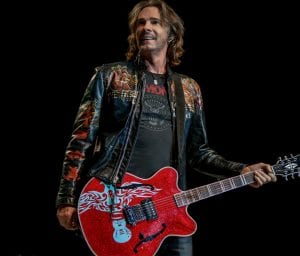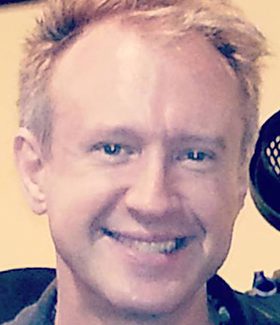Springfield Rockets Into The I Wi On ‘Rocket Science’ Tour
 His songs are fueled by huge, infectious guitar hooks often subverted by deceptively dark lyrics.
His songs are fueled by huge, infectious guitar hooks often subverted by deceptively dark lyrics.
His autobiography seeps with tales of debauchery, depression and a failed suicide attempt.
He’s narrowly escaped death at least three times, he once registered a handful of kills in a war zone and his commercial heyday was marked by striking post-apocalyptic videos directed by “Seven” auteur David Fincher.
Is it Marilyn Manson? Trent Reznor?
Nope, it’s Rick Springfield, who will perform with opening acts The Fixx and The Romantics at 7:30 p.m. at the I wireless center, Moline. For tickets and more info, call (309) 764-2001.
While routinely associated with soap opera stardom and ‘80s teen female adulation, the man born Richard Lewis Springthorpe has had a fascinatingly diverse life and career, one which has begun to gain proper recognition and perspective, in part due to his critically-acclaimed turn in the “Sound City” documentary and major kudos from its star, Nirvana and Foo Fighters drummer Dave Grohl, and in part due to the buzz generated by Springfield’s latest album, “Rocket Science,” and his cool, ultra-interactive, steampunk-inspired website.
Springfield took some time out of his busy schedule to e-chat with me about his career, spanning back to his early ‘70s hit “Speak to the Sky,” through his mammoth breakthrough in the ‘80s with “Jessie’s Girl” (a song written in the late ‘70s about his friend Gary’s girl when Springfield was a heavily bearded chap raising chickens in his back yard and making stained glass in his garage) and almost two dozen other hits, into the ‘90s with the Vegas extravaganza “EFX” and beyond to the present.
Q: How is the new tour going? You’ve been touring for over 40 years now, how does it feel and how do you keep things fresh and exciting for you as a performer?
A: By writing and playing new songs. Changing stage production and song sets. And every audience is different. I play to the audience and get energy from them.
Q: You’ve always been a serious rock musician, but due to your record company’s early efforts to promote you as a teen idol, and then your emergence as an actor at the same time your career resurged in the early ’80s, you’ve had to deal with a lot of misperceptions regarding your work and persona. With the documentary and the open fandom expressed by other musicians including Dave Grohl, do you feel some sense of redemption or at least overdue recognition for your work?
A: Yes I do. But I’ve always seen myself as a serious writer and player and I think that is the most important thing. You can’t let other people’s negative opinions of you change who you are. That’s the reason I keep writing and performing. Because I believe in what I do and I know some of the songs I’ve written have touched people.
Q: Even going back to your second album, “Comic Book Heroes,” and up through your ’80s work (including “Jessie’s Girl,” which is lyrically a subversive song about a severely insecure guy trying to steal his friend’s girlfriend), many of your songs have had darker lyrics undercutting the shiny pop tunes. You’re extremely candid in your biography, “Late, Late at Night” in regard to your battles with depression, infidelity and alcohol. Is that Darkness still a prominent factor in your life and work, or do you think you’ve conquered or at least suppressed it? Also, how do you feel it’s helped you in a way, to help you connect with your fans on a creative and personal level? After all, while “Jessie’s Girl,” your biggest of almost two dozen hits, was propelled by a memorable hook, its resonance was also in the longing and jealousy expressed in the lyrics which touched a chord with everyone who, romantically, has longed for something they could never have.
A: Depression is a life sentence that you can’t go to rehab to kick. But the upside is it’s usually the place where art comes from. Certainly my writing comes from that place. I’ve only ever written one ‘party’ song in my whole life (“Love is Alright Tonite”) and the majority of writing comes from looking deeply at stuff that is upsetting me in some way. That’s how you spend so much time looking at a subject, because it bothers you, and that’s usually when an original view or idea can be formed.
Q: Your career story is one of perseverance and fate in many ways. It seemed like every time your career was close to being over, and even sometimes when your life was close to being over, something happened, often out of the blue, to resurrect it. In your biography you seem to struggle with a belief system. Looking back, however, do you feel like something or someone has always been looking out for you?
A: I do feel that I have had ‘help.’ I’m just still trying to figure out if it’s actual spiritual help or the fact that once you are committed to an idea and believe in it, things ‘happen’ and the universe gets behind you to fulfill that desire. And depending on what you’re focusing on, that can be good or bad stuff. Like the old internet story of the Indian chief telling his son there are two wolves fighting inside everyone. A good wolf and a bad wolf and the son asks which one wins. The chief says ‘the one you feed.’ I have experienced this in my own life — what I focus on, manifests.
Q: What do you remember most fondly of your ’80s pop superstardom? What accomplishments stand out as being sweetest in retrospect?
A: Writing songs that people ‘get.’ I love writing in all its forms (even off color poems on public bathroom walls).
Q: While singing “Jessie’s Girl,” which you likely do at every show, obviously, do you ever stop yourself mid-song and think, “Thank God I didn’t get Gary’s girl! I might still be a thick-bearded guy making stained glass and raising chickens in my back yard…”?
A: I do think something along those lines occasionally but I think if it hadn’t been that song, it would have been another. But I am very thankful (for once) that I didn’t get laid.
 Q: Your Vegas years, in many ways, mirrored the city itself. You were part of a hugely successful production, EFX, you experienced profound humanity in meeting and losing Sahara (a little girl who was a huge fan, who Springfield befriended and who lost a battle with cancer during that time), and severe depression and darkness that was reflected in the “Shock” album. How do you feel those years, on a personal and professional level, shaped you as a performer and still resonate with you today?
Q: Your Vegas years, in many ways, mirrored the city itself. You were part of a hugely successful production, EFX, you experienced profound humanity in meeting and losing Sahara (a little girl who was a huge fan, who Springfield befriended and who lost a battle with cancer during that time), and severe depression and darkness that was reflected in the “Shock” album. How do you feel those years, on a personal and professional level, shaped you as a performer and still resonate with you today?
A: It showed me the truth of what I said before. What you focus on, manifests. I saw that in Vegas on the light and the dark side. It was kind of my ‘lost weekend’ that time in Vegas. Very stressful on everyone in my family. I did come away with a sense that I could just as easily screw everything up as move forward in a positive way
Q: How do you think your early experiences as a teen idol, as well as the long career valley afterward, and even your experiences in Viet Nam, gave you a greater perspective and grounding when you shot to much greater fame later on?
A: The dry times certainly gave me time to reflect on how I would handle myself if and when fame did show up. My family was the major influence in me keeping my head to a degree when the rocket ride started.
Q: Your website and media platform is very contemporary — the site is fun and interactive and contains a lot of elements of steampunk, it’s really cool and modern. How do you feel your embrace of the techie side of things helped you to segue into what the modern music industry and entertainment industry has become?
A: I think you have to have a degree of the ‘techie’ in you to create your own music and I embrace it as much as it can facilitate that. I’m not a wire head but I have some knowledge that helps me in the music process.
Q: Given what you’ve achieved over the years, what do you feel your legacy is, and will be, and furthermore, what do you still hope to accomplish?
A: I have no idea what my legacy would be. I hope it’s not Soap Opera actor. (He laughs). I have a lot I still want to do writing, acting, touring wise. I am driven always to do more, which is probably a good and a bad thing.
Q: Thanks for your time, and best of luck with the tour. Enjoy your stay in the Quad-Cities.
A: Thanks.









